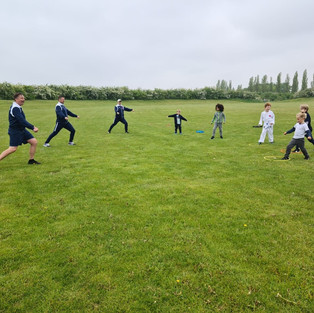Corona, karate and Itosu-kai Denmark
- IKIF
- Jun 7, 2020
- 3 min read

Itosu-kai Denmark teaches karate outside during the pandemic.
A status from Bosatsu in Copenhagen
In Denmark people started talking about COVID 19 in february this year. At first, the virus
seemed far away, and was the cause of little, if any, alarm. But as reports of the virus
spreading in Italy started coming in, the board in Bosatsu decided to take the necessary
precautions. We decided on a limit to how many students each room in our dojo could
accommodate, how parents should act once they had dropped off their kids, which classes
we would have to postpone or even cancel, and how to raise the level of hygiene in the club.
Everything was in place. The plan was clear. Or so we thought.
Lockdown
The very next evening - March 11th, the Danish Prime Minister held a press conference. She
announced that major parts of the country would be under lockdown, effective immediately.
All the plans we had just made went out the window. The club was closed. All classes were
canceled. Initially for two weeks, but it quickly became clear, that this would be extended
indefinitely.

The lockdown meant cancellations all over the place. All national tournaments were either
postponed or cancelled, including the Danish National Championships, where all three
Danish Itosukai clubs had high expectations, coming off good results in the last year. At
Kaizen Karatedo in Kolding, they were sadly also forced to cancel their own Doryoku Cup.
Cancellations weren’t only national, though. Sensei Michael Andersen (Bosatsu) and Sensei
Tejs Damkjær (Dragør) were both supposed to travel with the Danish national team to the
European Championships in Azerbaijan, but this too was cancelled.
The board got together (virtually), and set things in motion in order to inform the members
about the new reality. But we also decided, that we should look into any and all opportunities
for keeping the club alive, and making sure that we had something to return to, after the
crisis.
Planning ahead
In the beginning of the lockdown, training was not an option. Instead we spent time setting
new goals for the club, and defining values and visions for where how we want to see
Bosatsu developing. We rarely have time for these reflections in an otherwise busy
schedule, but lockdown gave us the perfect opportunity for important discussion, that will
hopefully pave the way for an even stronger club in the years to come.
Also, we decided to keep our students motivated by posting daily drills on instagram, and
encouraging them to share videos of their home training sessions.
A window of opportunity
After the first couple of weeks on lockdown, following the restrictions from our national
authorities, we discovered the possibility of doing outdoor training sessions in small groups,
with ample distance. We decided to try it out - at first we let our competition team meet up
and train together. Obviously, sparring was not an option, but drills, physical training and
cardio made sense, and the students were thrilled to meet up and train together. It was an
immediate success.
The clubs in Dragør and Kolding also quickly got started on outdoor training, so the entire
Danish Itosukai family soon got back on their feet after a devastationg blow. In Dragør they
even managed to involve the youngest students in the outdoor sessions.
Expanding the activities

We quickly began adding more classes to the outdoor plan. Kids, youths and adults all
signed up for park training, and even though it presents an extra workload to the instructors
(we have a maximum of 9 students pr. group - by law), everyone in and around the club is
happy to take part.
Eventually, we were also able to provide training for the toddlers, and our kumite competition
team have just been allowed to do light sparring. So at this point, more than half the students
in the club train in the park, training is scheduled for 5 times a week, and even though it is
different, we are enjoying every minute of it.
A different kind of belt test
These activities also mean that we will be able to stick to our plan of doing a big belt test in
June, although it might have to happen in the park instead of the dojo.
It will be different and challenging to our students, but it will also be a test they will never
forget.
Michael Andersen
The Chief Instructor
Itosu-kai Denmark



















Comments